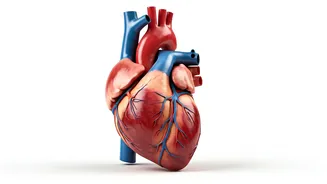Myth 1: Detox Diets
Detox diets are a popular trend, often marketed as a quick fix for cleansing the body. However, the claim that these diets effectively remove toxins is
largely unfounded. Your body has its own built-in detoxification system, primarily the liver and kidneys, which constantly filter and eliminate waste. These organs are designed to handle the daily detoxification process without the need for extreme dietary interventions. The idea that specific foods or juices can drastically improve this process is often overstated. While healthy eating is essential for overall well-being, the concept of a 'detox' diet as a necessary health boost is largely a myth. Focus on supporting your body's natural processes with a balanced diet, regular exercise, and adequate hydration rather than relying on unproven detox methods.
Myth 2: Carbs are Bad
The demonization of carbohydrates is another common misconception. Carbs are a primary source of energy for your body and play a crucial role in various bodily functions. The focus should be on the type and amount of carbohydrates consumed rather than eliminating them entirely. Complex carbohydrates, like whole grains, fruits, and vegetables, provide essential nutrients and fiber that promote good health. Simple carbs, found in processed foods and sugary drinks, should be consumed in moderation. A balanced diet incorporates appropriate carb intake, along with proteins and healthy fats. It's important to differentiate between good and bad carbohydrates and choose sources that support overall wellness.
Myth 3: Exercise Myth
The belief that you must work out intensely for hours to see any benefit from exercise is a common misconception. While regular physical activity is undeniably beneficial, achieving substantial health improvements doesn't always require grueling workouts. Even moderate exercise, such as brisk walking for 30 minutes a day, can significantly reduce the risk of chronic diseases, improve mood, and boost overall health. Consistency is key, and finding an exercise routine you enjoy makes it easier to stick with it long-term. Short bursts of high-intensity interval training (HIIT) can also provide remarkable benefits in a short amount of time. The focus should be on integrating physical activity into your daily life rather than feeling overwhelmed by the thought of intense workouts.
Myth 4: Supplements Are Always
The assumption that all supplements are safe and necessary for everyone is a widespread fallacy. While supplements can address specific nutrient deficiencies or support certain health goals, they are not a substitute for a balanced diet. Moreover, some supplements may interact with medications or have adverse effects, especially if taken in excessive doses. Always consult with a healthcare professional before starting any new supplement regimen. They can assess your individual needs and help you choose appropriate supplements. Remember that food should always be the primary source of nutrients; supplements should be used judiciously, and only when necessary.
Myth 5: Gluten Sensitivity
The gluten-free craze has led many to believe that they have gluten sensitivity, but this isn't the case. While celiac disease is a genuine autoimmune condition, most people do not have a medical need to avoid gluten. Many individuals experience gastrointestinal symptoms after eating gluten, and often self-diagnose as gluten-sensitive. These symptoms could be related to other factors, such as FODMAPs (fermentable oligosaccharides, disaccharides, monosaccharides, and polyols), other food intolerances, or simply eating too much of a particular food. If you experience digestive problems, it's essential to see a doctor to get an accurate diagnosis, rather than eliminating gluten without professional guidance. A needless gluten-free diet can also limit your intake of beneficial nutrients found in wheat and other grains.
Myth 6: Sugar Causes Diabetes
Although the consumption of excessive sugar does contribute to a higher risk of type 2 diabetes, the disease is not solely caused by sugar intake. Several other factors play crucial roles, including genetics, lifestyle, and body weight. Type 2 diabetes develops when the body becomes resistant to insulin, a hormone that regulates blood sugar levels. Factors such as obesity, lack of exercise, and a family history of diabetes significantly contribute to insulin resistance. While sugar intake should be moderated, it’s only one part of the bigger picture of diabetes. A comprehensive approach involves healthy eating habits, regular physical activity, and weight management to reduce risk.
Myth 7: All Fat Is Bad
This myth has long been circulating, and it’s time to debunk it. Not all fats are created equal, and some fats are essential for good health. Unsaturated fats, found in foods like avocados, nuts, and olive oil, are beneficial for heart health and can help lower bad cholesterol levels. Saturated fats, often found in animal products, should be consumed in moderation. Trans fats, often found in processed foods, are the type of fats to strictly limit as they have been linked to an increased risk of heart disease. The key is to choose the right types of fats and balance your diet with a variety of nutrient-rich foods.
Myth 8: You Can 'Catch' Colds
While it's true that colds and the flu are contagious, the idea that simply being cold can cause a cold is a misconception. Viruses cause colds and the flu. The cold weather might make it more likely to contract these viruses because people tend to spend more time indoors, which makes it easier for viruses to spread, or because the viruses thrive better in cold conditions. But the act of being cold does not cause a viral infection. Factors like immune system, exposure to viruses, and general health are what truly decide the risk of getting sick. Washing hands frequently and avoiding close contact with infected individuals is more effective at preventing colds and flu.
Myth 9: Coffee Is Unhealthy
This myth has long persisted, but research suggests that coffee can offer various health benefits. Coffee is rich in antioxidants and can be linked to improved liver health, reduced risk of type 2 diabetes, and a lower chance of developing some cancers. Moderate coffee consumption can also boost mental alertness and enhance cognitive function. Like with any food, moderation is key; excessive coffee consumption can lead to side effects like anxiety, insomnia, or jitters. Adding lots of sugar and cream to your coffee can also negate some of its potential health benefits. Generally, enjoying coffee in moderation can be part of a healthy lifestyle for many people.
Myth 10: Sleep is Optional
The belief that you can thrive on minimal sleep is a dangerous fallacy. Sleep is crucial for physical and mental health. During sleep, your body repairs itself, and your brain consolidates memories. Lack of sleep can lead to various health problems, including increased risk of chronic diseases, impaired cognitive function, weakened immunity, and mood disorders. Adults generally need around 7–9 hours of sleep per night. Prioritizing sleep is not a luxury, it is a necessity for overall well-being. Practicing good sleep hygiene, such as maintaining a consistent sleep schedule, creating a relaxing bedtime routine, and avoiding electronic devices before bed, can drastically improve the quality of your sleep.



















